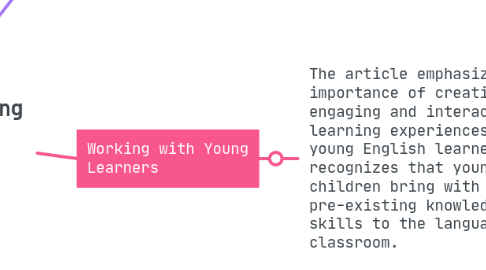
1. The Young Language Learner
1.1. This text explores the critical stages of development for children between the ages of five and eleven, emphasizing the importance of recognizing their unique abilities,interests, and learning styles.
1.1.1. Language Development
1.1.1.1. It's important to create a supportive and stimulating environment for children to learn and practice language skills.
1.1.1.1.1. Play with Language
2. Characteristics of Young Children
2.1. This article mentions that young children come to the language classroom with pre-existing knowledge and skills.
2.1.1. Kids grow and learn a lot between five and eleven years old. Each child learns in their own way and at their own speed.
2.1.1.1. Teachers should understand children's characteristics and learning styles to improve their teaching.
2.1.1.1.1. Five to Seven-Year-Olds:
2.1.1.1.2. Eight to Ten-Year-Olds:
3. Working with Young Learners
3.1. The article emphasizes the importance of creating engaging and interactive learning experiences for young English learners. It recognizes that young children bring with them pre-existing knowledge and skills to the language classroom.
3.1.1. To effectively engage young learners, the article advocates for incorporating games, songs, and stories into language lessons.
3.1.1.1. The article also discusses children's remarkable ability to grasp meaning and their creative use of limited language resources.
3.1.1.1.1. The role of imagination is a powerful tool for language learning, allowing children to explore new ideas and express themselves creatively.
4. Insight from Other Authors
4.1. Authors like Lev Vygotsky and Jean Piaget emphasize the importance of understanding children's cognitive development.
4.1.1. In his influential work, 'Mind in Society' published in 1978, Lev Vygotsky introduced the concept of the zone of proximal development (ZPD), which highlights the importance of social interaction and support in children's learning.
4.1.1.1. Similarly, Jean Piaget's research on cognitive development, outlined in 'The Psychology of Intelligence' published in 1952, introduced the stages through which children progress as they construct their understanding of the world.
